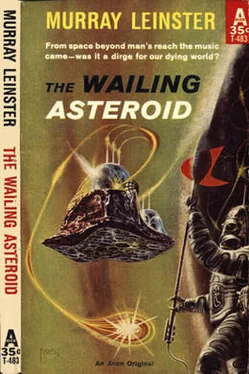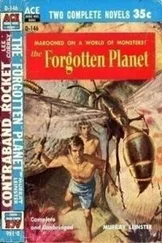Organizations came into being with the official and impassioned purpose of seeing that space research ceased immediately. Even more violent organizations demanded the punishment of everybody who had ever considered space travel a desirable thing. Congress cut some hundreds of millions from a guided–missile–space–exploration appropriation as a starter. A poor devil of a crackpot in Santa Monica, California, revealed what he said was a spaceship he'd built in his back yard to answer the signals from M–387. He intended to charge a quarter admission to inspect it, using the money to complete the drive apparatus. The thing was built of plywood and could not conceivably lift off the ground, but a mob wrecked his house, burned the puerile "spaceship" and would have lynched its builder if they'd thought to look in a cellar vegetable closet. Other crackpots who were more sensitive to public feelings announced the picking up of messages addressed to the distant Something. The messages, said this second class of crackpot, were reports from spies who had been landed on Earth from flying saucers during the past few decades. They did not explain how they were able to translate them. A rush of flying–saucer sightings followed inevitably—alleged to be landing–parties from M–387—and in Peoria, Illinois, a picnicking party sighted an unidentified flying object shaped like a soup spoon, the handle obviously being its tail. Experienced newspapermen anticipated reports of the sighting of unidentified flying objects shaped like knives and forks as soon as somebody happened to think of it.
Sandy called a conference on the subject of security. She did not look well, nowadays. She worried. Other people thought about the messages from space, but Sandy had to think of something more concrete. Six months earlier, the construction going on within a plaster of Paris mould would have been laughed at, tolerantly, and some hopeful people might have been respectful about it. But now it was something utterly intolerable to public opinion. Newspapers who'd lost circulation by talking sanely about space travel now got it back by denouncing the people who'd answered the first broadcast. And naturally, with the whole idea of outer space agitatedly disapproved, everybody connected with it was suspected of subversion.
"A reporter called up today," said Sandy. "He said he'd like to do a feature story on Burke Development's new research triumph—the new guided missile that flew thirty miles and froze everything around where it landed. I said it fell out of an aeroplane and the last completed project was for Interiors, Inc. Then he said that he'd been talking to one of Mr. Holmes' men and the man said something terrific was under way."
Burke looked uneasy. Holmes said uncomfortably, "There's no law against what we're building, but somebody may introduce a bill in Congress any day."
"That would be reasonable under other circumstances. There's a time for things to be discovered. They shouldn't be accomplished too soon. But the time for the ship out there is right now!" Burke said.
Pam raised her eyebrows. "Yes?"
"Those signals have to be checked up on," explained Burke. "It's necessary now. But it could have been bad if our particular enterprise had started, say, two years ago. Just think what would have happened if atomic fission had been worked out in peacetime ten years before World War Two! Scientific discoveries were published then as a matter of course. Everybody'd have known how to make atom bombs. Hitler would have had them, and so would Mussolini. How many of us would be alive?"
Sandy interrupted, "The reporter wants to do a feature story on what Burke Development is making. I said you were working on a bomb shelter for quantity production. He asked if the rocket you shot off through the construction–shed wall was part of it. I said there'd been no rocket fired. He didn't believe me."
"Who would?" asked Holmes.
"Hmmmmm," said Burke. "Tell him to come look at what we're doing. The ship can pass for a bomb shelter. The wall–garden units make sense. I'm going to dig a big hole in the morning to test the drive–shaft in. It'll look like I intend to bury everything. A bomb shelter should be buried."
"You mean you'll let him inside?" demanded Sandy.
"Sure!" said Burke. "All inventors are expected to be idiots. A lot of them are. He'll think I'm making an impossibly expensive bomb shelter, much too costly for a private family to buy. It will be typical of the inventive mind as reporters think of it. Anyhow, everybody's always willing to believe other people fools. That'll do the trick!"
Pam said blandly, "Sandy and I live in a boardinghouse, Joe. You don't ask about such things, but an awfully nice man moved in a couple of days ago—right after that shaft got away and went flying thirty miles all by itself. The nice man has been trying to get acquainted."
Holmes growled, and looked both startled and angry when he realized it.
Pam added cheerfully, "Most evenings I've been busy, but I think I'll let him take me to the movies. Just so I can make us all out to be idiots," she added.
"I'll make the hole big enough to be convincing," said Burke. "Sandy, you make inquiries for a rigger to lift and move the bomb shelter into its hole when it's ready. If we seem about to bury it, nobody should suspect us of ambitions they won't like."
"Why the hole, really?" asked Sandy.
"To put the shaft in," said Burke. "I've got to get it under control or it won't be anything more than a bomb shelter."
Keller, the instrument man, had listened with cheerful interest and without speaking a word. Now he made an indefinite noise and looked inquiringly at Burke. Burke said, explanatorily, "The shaft seems to be either on or off—either a magnet that doesn't quite magnetize, or something that's hell on wheels. It flew thirty miles without enough power supplied to it to make it quiver. That power came from somewhere. I think there's a clue in the fact that it froze everything around where it landed, in spite of traveling fast enough to heat up from air–friction alone. I've got some ideas about it."
Keller nodded. Then he said urgently, "Broadcast?"
Burke frowned, and turned to Sandy. "That's part of the broadcast from space that changes—is it still changing?"
"Still changing," said Sandy.
"I didn't think to ask you to keep a check on that. Thanks for thinking of it, Sandy. Maybe someday I can make up to you for what you've been going through."
"I doubt it very much," said Sandy grimly. "I'll call the reporter back."
She waited for them to leave. When they'd gone, she moved purposefully toward the telephone.
Pam said, "Did you hear that growl when I said I'd go to the movies with somebody else? I'm having fun, Sandy!"
"I'm not," said Sandy.
"You're too efficient," the younger sister said candidly. "You're indispensable. Burke couldn't begin to be able to put this thing through without you. And that's the trouble. You should be irresistible instead of essential."
"Not with Joe," said Sandy bitterly.
She picked up the telephone to call the newspaper. Pam looked very, very reflective.
There was a large deep pit close by the plaster mould when the reporter came next afternoon. A local rigger had come a little earlier and was still there, estimating the cost for lifting up the contents of the mould and lowering it precisely in place to be buried as a bomb shelter under test should be. It was a fortunate coincidence, because the reporter brought two other men who he said were civilian defense officials. They had come to comment on the quality of the bomb shelter under development. It was not too convincing a statement.
When they left, Burke was not happy. They knew too much about the materials and equipment he'd ordered. One man had let slip the fact that he knew about the very expensive computer Burke had bought. It could have no conceivable use in a bomb shelter. Both men painstakingly left it to Burke to mention the thirty–mile flight of a bronze object which arrived coated with frost of such utter frigidity that it appeared to be liquid–air snow instead of water–ice. Burke did not mention it. He was excessively uneasy when the reporter's car took them away.
Читать дальше







